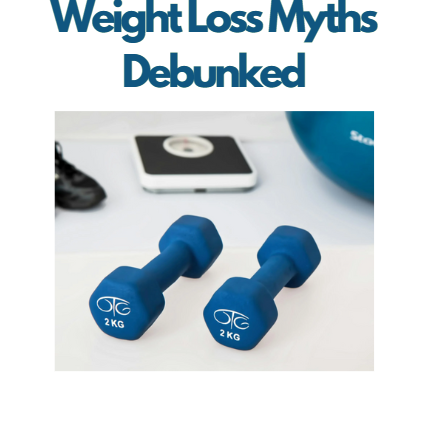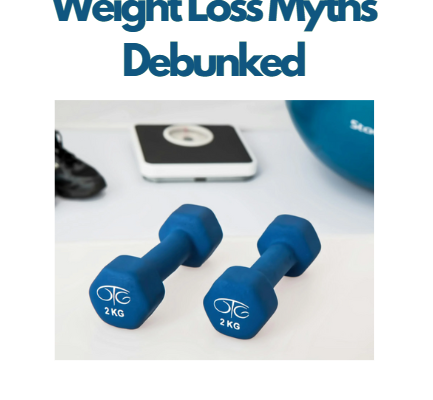Weight Loss Myths Debunked: What You Really Need to Know ? In the world of health and fitness, weight loss is one of the most misunderstood and myth-ridden topics. From social media influencers pushing magic detox teas to outdated advice passed down through generations, it’s easy to get lost in misinformation. But here’s the truth: many of the things you believe about weight loss might actually be holding you back. In this in-depth guide, we’re cutting through the noise and debunking the biggest weight loss myths—so you can focus on what really works.
Myth 1: Carbs Make You Fat
The Truth: It’s the Excess Calories, Not Carbs
Carbohydrates have been demonized for years, but blaming carbs for weight gain is oversimplified. The reality is, weight gain occurs when you consistently consume more calories than your body burns, regardless of whether those calories come from carbs, fat, or protein.
Whole carbs—like oats, brown rice, quinoa, and vegetables—are packed with nutrients and fiber, which help keep you full longer. What does contribute to fat gain? Overeating refined carbs and sugars that spike insulin and provide empty calories. But moderate, smart carb intake can fuel workouts, stabilize blood sugar, and support long-term fat loss.
Myth 2: You Need to Do Hours of Cardio to Lose Weight
The Truth: Resistance Training and NEAT Matter More
While cardio does help burn calories, it’s not the magic bullet for fat loss. In fact, relying solely on cardio can lead to muscle loss, especially if you’re also eating at a calorie deficit.
The real game-changer? Strength training. Building muscle helps increase your resting metabolic rate, meaning you burn more calories even while at rest. Additionally, Non-Exercise Activity Thermogenesis (NEAT)—things like walking, cleaning, and fidgeting—can account for a significant portion of daily energy burn.
The best weight loss results come from a balanced mix of strength training, light cardio, and staying active throughout the day.
Myth 3: Eating Fat Makes You Fat
The Truth: Healthy Fats Are Essential
This myth has been around for decades, but it’s outdated and incorrect. Dietary fat is not the same as body fat. In fact, fats are essential for hormone production, brain health, and nutrient absorption.
The key is choosing the right kinds of fat:
- Healthy fats: Avocados, olive oil, nuts, seeds, fatty fish
- Unhealthy fats: Trans fats and excess saturated fats found in fried and processed foods
Including healthy fats in your diet can actually help you feel full and satisfied, reducing the urge to overeat. Aim for a balanced intake, and don’t fear fats—they’re a crucial part of any sustainable diet plan.
Myth 4: Skipping Meals Helps You Lose Weight
The Truth: Skipping Meals Can Backfire
It might seem logical—eat fewer meals, consume fewer calories, right? Not exactly. Skipping meals often leads to increased hunger, cravings, and binge eating later in the day.
Plus, regularly skipping meals can mess with your metabolism, blood sugar levels, and even your mood. If you’re not doing a structured intermittent fasting approach (and even that has limitations), skipping meals usually sets you up for poor eating habits.
The best approach? Eat balanced meals regularly that include protein, fiber, and healthy fats to keep you full and energized.
Myth 5: Supplements and Detox Teas Speed Up Weight Loss
The Truth: They’re Mostly Marketing Gimmicks
The weight loss industry is worth billions—and much of that comes from selling hope in a bottle. From fat-burning pills to detox teas, most of these products are either ineffective, temporary, or downright harmful.
Real, sustainable fat loss doesn’t come from quick fixes. It comes from consistent habits: eating nutrient-dense foods, managing stress, getting quality sleep, and staying active.
Save your money. Instead of looking for shortcuts, invest in whole foods and daily movement—they offer real, lasting results.
Myth 6: You Have to Eat Every 2-3 Hours to Boost Metabolism
The Truth: Meal Timing Isn’t as Important as You Think
This myth is based on the belief that frequent eating keeps your metabolism “revved up.” But studies show meal frequency doesn’t significantly affect metabolism or fat loss.
What matters more is total daily calorie intake and food quality. Whether you eat three big meals or six small ones, weight loss still boils down to maintaining a calorie deficit.
Choose an eating schedule that fits your lifestyle and helps you stay consistent. If that’s intermittent fasting, great. If it’s three square meals, that’s fine too. The key is sustainability.
Myth 7: You Can Spot Reduce Fat
The Truth: Fat Loss Happens Systemically
Doing 100 crunches won’t give you six-pack abs if you’re not in a calorie deficit. That’s because you can’t target fat loss in specific areas of the body. Your genetics determine where you lose fat first and where it sticks around longest.
The solution? Focus on overall fat loss through a consistent calorie deficit, exercise, and healthy eating. As your body fat percentage drops, stubborn areas like belly fat will gradually reduce.
Myth 8: Weight Loss Is All About Willpower
The Truth: Biology and Environment Play Major Roles
It’s easy to blame a lack of discipline, but weight loss is much more complex. Hormones like insulin, leptin, ghrelin, and cortisol can influence hunger, cravings, and fat storage. So can sleep quality, stress levels, and even the people around you.
Set yourself up for success by:
- Getting 7–9 hours of sleep
- Managing stress
- Creating a supportive environment
- Planning meals and snacks ahead of time
Yes, effort matters. But long-term weight loss is about strategic consistency, not brute force.
Myth 9: The Scale Is the Best Way to Measure Progress
The Truth: It’s Just One of Many Tools
The scale can be helpful, but it doesn’t tell the whole story. Your weight fluctuates daily due to hydration, muscle gain, hormones, and digestion. Relying solely on it can lead to frustration and discouragement.
Instead, track your progress using:
- Measurements (waist, hips, chest)
- Progress photos
- Energy levels and mood
- Clothing fit
- Workout performance
Focus on non-scale victories, and remember that body composition (fat vs. muscle) is more important than the number on the scale.
Myth 10: There’s One Best Diet for Everyone
The Truth: The Best Diet Is the One You Can Stick To
Keto, Paleo, Vegan, Mediterranean—every diet works for someone. But no diet works for everyone. What matters most is consistency, sustainability, and nutrient density.
Ask yourself:
- Can I follow this long-term?
- Does this diet include all food groups I enjoy?
- Does it support my energy and health?
The best diet is one that fits your lifestyle, goals, and preferences. There’s no one-size-fits-all plan.
Conclusion
Weight loss doesn’t have to be complicated—but it does require separating fact from fiction. By understanding the science and ignoring the hype, you can create a personalized, realistic plan that actually works. Ditch the myths, trust the process, and focus on long-term health, not quick fixes.





